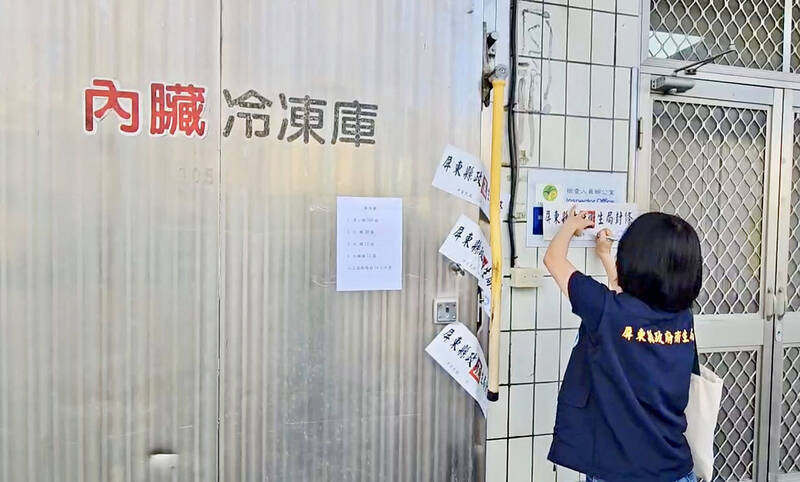The manager of a Pingtung-based food company that allegedly used industrial-grade hydrogen peroxide to bleach pig intestines was on Wednesday released on bail of NT$500,000.
Police said they had received tips that the company, in the county’s Changchih Township (長治), was bleaching pig intestines with industrial-grade hydrogen peroxide and selling them. Upon investigation, inspectors found empty barrels with residual hydrogen peroxide and hundreds of kilograms of pig intestines awaiting processing.
At least 2 tonnes of bleached intestines allegedly made their way into the market, they said.

Photo courtesy of a reader
The Pingtung District Prosecutors’ Office said it is looking into whether the company was bleaching the intestines to make them look more appealing or if it was to cover up issues with the intestines, such as if they were inflamed or sourced from sick hogs.
The Pingtung Health Department yesterday said it dispatched officials to seal the company’s warehouse, which contained 648 boxes, or 11,664kg, of sausages and intestines.
The company should stop selling its products and halt operations, in accordance with the Act Governing Food Safety and Sanitation (食品安全衛生管理法), it added.
In a statement yesterday, the Food and Drug Administration (FDA) said a joint inspection by health and agricultural agencies found the vendor had shipped around 3,000 kg of the intestines to downstream food vendors in Taipei, Taoyuan, Kaohsiung and Pingtung ahead of the Mid-Autumn Festival, which falls on tomorrow this year. Pork intestines are a popular choice for holiday barbecues in Taiwan.
Wei Jen-ting (魏任廷), head of the FDA's southern management center, said the inspection team on Thursday instructed local health authorities in the four jurisdictions to remove the tainted products from the market to protect public health.
As of last night, 2,104 kg of pork intestines had been recalled, he said.
Linkou Chang Gung Memorial Hospital Clinical Poison Center director Yen Tzung-hai (顏宗海) said that an overconcentration of hydrogen peroxide, regardless of whether it is industrial-grade or commercial, could cause digestive tract ulcers, gastrointestinal bleeding or even difficulty breathing.
Industrial-grade hydrogen peroxide could contain impurities or heavy metals due to manufacturing methods or improper storage, he said, adding that ingesting pig intestines that have been treated with impure industrial-grade hydrogen peroxide could be harmful to people’s health over the long term.
Lead, mercury and arsenic, the most common heavy metals found in industrial-grade hydrogen peroxide, are highly damaging to the liver and kidneys, and can cause nerve damage, Yen said.
If the pig intestines were bleached because they were moldy or came from sick pigs, they would carry germs and bacteria that cannot be eliminated through cooking and could lead to food poisoning, he said.
Yen urged the inspectors to ascertain whether there were heavy metal residues in the seized pig intestines, and to prevent problematic food from entering the market at the source.
Investigations are continuing, the prosecutors’ office said.
Additional reporting by CNA

The manufacture of the remaining 28 M1A2T Abrams tanks Taiwan purchased from the US has recently been completed, and they are expected to be delivered within the next one to two months, a source said yesterday. The Ministry of National Defense is arranging cargo ships to transport the tanks to Taiwan as soon as possible, said the source, who is familiar with the matter. The estimated arrival time ranges from late this month to early next month, the source said. The 28 Abrams tanks make up the third and final batch of a total of 108 tanks, valued at about NT$40.5 billion

Two Taiwanese prosecutors were questioned by Chinese security personnel at their hotel during a trip to China’s Henan Province this month, the Mainland Affairs Council (MAC) said yesterday. The officers had personal information on the prosecutors, including “when they were assigned to their posts, their work locations and job titles,” MAC Deputy Minister and spokesman Liang Wen-chieh (梁文傑) said. On top of asking about their agencies and positions, the officers also questioned the prosecutors about the Cross-Strait Joint Crime-Fighting and Judicial Mutual Assistance Agreement, a pact that serves as the framework for Taiwan-China cooperation on combating crime and providing judicial assistance, Liang

A group from the Taiwanese Designers in Australia association yesterday represented Taiwan at the Midsumma Pride March in Melbourne. The march, held in the St. Kilda suburb, is the city’s largest LGBTQIA+ parade and the flagship event of the annual Midsumma Festival. It attracted more than 45,000 spectators who supported the 400 groups and 10,000 marchers that participated this year, the association said. Taiwanese Designers said they organized a team to march for Taiwan this year, joining politicians, government agencies, professionals and community organizations in showing support for LGBTQIA+ people and diverse communities. As the first country in Asia to legalize same-sex

MOTIVES QUESTIONED The PLA considers Xi’s policies toward Taiwan to be driven by personal considerations rather than military assessment, the Epoch Times reports Chinese President Xi Jinping’s (習近平) latest purge of the Chinese People’s Liberation Army (PLA) leadership might have been prompted by the military’s opposition to plans of invading Taiwan, the Epoch Times said. The Chinese military opposes waging war against Taiwan by a large consensus, putting it at odds with Xi’s vision, the Falun Gong-affiliated daily said in a report on Thursday, citing anonymous sources with insight into the PLA’s inner workings. The opposition is not the opinion of a few generals, but a widely shared view among the PLA cadre, the Epoch Times cited them as saying. “Chinese forces know full well that